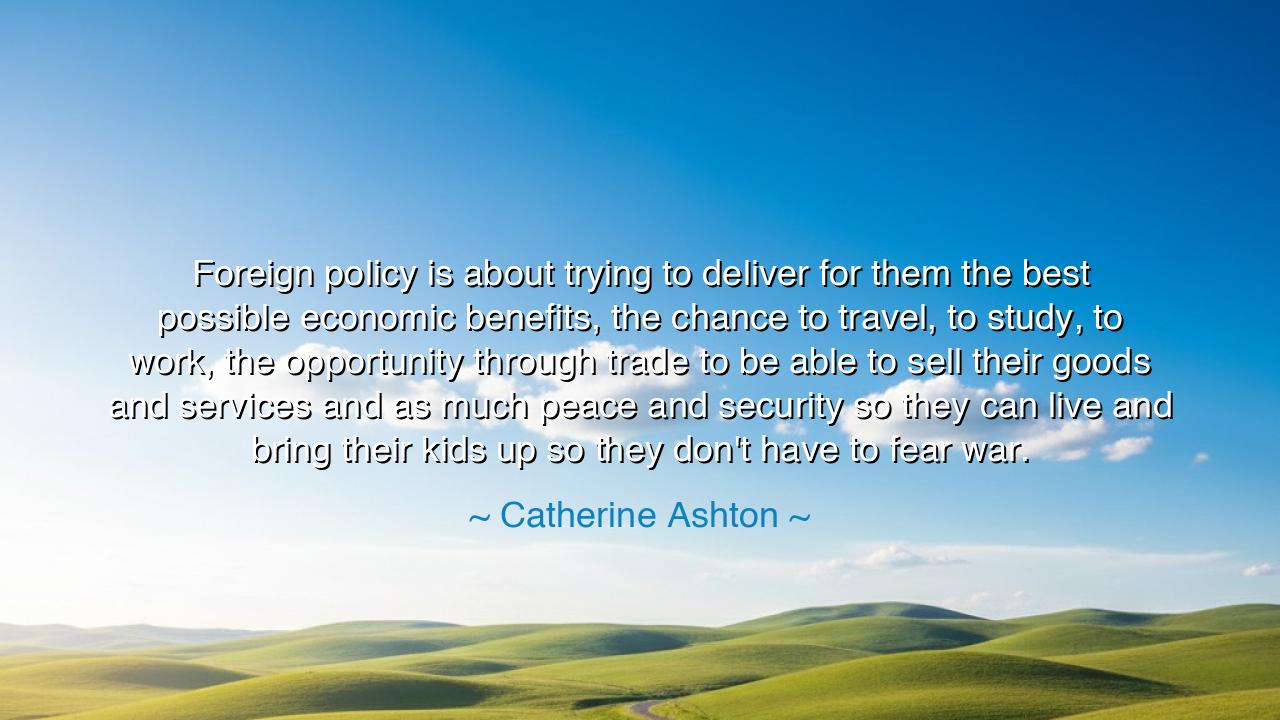
Foreign policy is about trying to deliver for them the best
Foreign policy is about trying to deliver for them the best possible economic benefits, the chance to travel, to study, to work, the opportunity through trade to be able to sell their goods and services and as much peace and security so they can live and bring their kids up so they don't have to fear war.






So spoke Catherine Ashton, diplomat and steward of nations, who sought not war but the weaving of harmony among peoples: “Foreign policy is about trying to deliver for them the best possible economic benefits, the chance to travel, to study, to work, the opportunity through trade to be able to sell their goods and services and as much peace and security so they can live and bring their kids up so they don’t have to fear war.” Her words shine with the clarity of one who sees beyond the pomp of treaties and the pride of governments, into the very heart of why states exist—to serve the ordinary lives of their people.
Too often rulers mistake foreign policy for games of power, for maps divided by ambition, for the endless calculation of advantage. But Ashton reveals the deeper purpose: that policy must not serve pride, but people. It is not the generals nor the diplomats who are the truest measure of peace, but the child who can grow without fear, the worker who can labor in dignity, the student who can cross borders to learn, the merchant who can sell his goods in fairness. This is the sacred foundation of peace—not conquest, but opportunity.
The ancients knew this truth. Consider Pericles of Athens, who declared in his funeral oration that the greatness of the city was not only in its armies but in the freedom it gave its citizens to work, to trade, to live fully. Or think of the Pax Romana, where Rome’s strength was not merely the sword, but the roads, markets, and security it offered across vast lands. The farmer in Gaul or the merchant in Egypt cared little for imperial politics, but deeply for the ability to raise children and sell goods without fear. So too does Ashton echo this ancient truth: policy must rest on the welfare of the common person.
History gives us darker reminders as well. After the First World War, leaders spoke of peace but imposed punishment, crippling economies and sowing despair. The ordinary people—those who needed security, work, and dignity—found only hardship, and from their suffering arose another, greater war. By contrast, after the Second World War, leaders of foresight turned to trade, rebuilding, and cooperation. Through initiatives like the Marshall Plan and the formation of new alliances, nations that once warred became partners. Why? Because leaders remembered that peace is built not only on treaties, but on bread, on education, on the hope of a better life.
The lesson for us, then, is that peace is not the absence of battlefields but the presence of well-being. Where there is opportunity, war is less likely; where there is dignity, hatred is less fertile. If we seek to build peace in our time, we must labor not only in the halls of government, but in schools, in farms, in markets, ensuring that people can live with enough—enough food, enough knowledge, enough security for their children’s future.
And in our own lives, we too can embody this wisdom. In our families, in our communities, in our work, let us measure success not by triumph over others but by how well we uplift those around us. Let us think as Ashton thought: how do my choices give others opportunity, dignity, and security? In this way, each of us becomes a peacemaker, not in words alone, but in action.
Thus, Catherine Ashton’s words endure as a charge for all ages: foreign policy is not for the glory of rulers but for the good of people. Let those who lead remember this, and let those who follow demand it. For only when the well-being of the common soul is honored will peace and security truly endure, and only then will nations rise not through war, but through the flourishing of their people.






AAdministratorAdministrator
Welcome, honored guests. Please leave a comment, we will respond soon